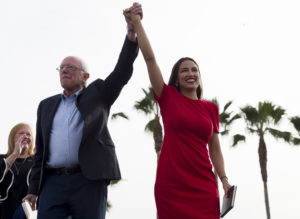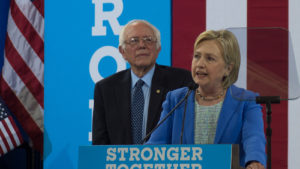For Middle- and Working-Class Americans, Running for Congress Is Nearly Unaffordable
Most members of Congress are financially better off than the people they represent. Alexandria Ocasio-Cortez. (daddyodilly / Flickr Creative Commons)
Alexandria Ocasio-Cortez. (daddyodilly / Flickr Creative Commons)
The candidate pool in the 2018 midterm elections was more diverse, female and full of first-time candidates than ever. Democrats nominated 180 women, 60 more than the previous record of 120, according to data from Rutgers University Center for American Women in Politics, Politico reports. They also nominated 133 people of color and 158 first-time candidates. But while Congress may look a little more like America in January, amid the celebrations of all these firsts is a harsher truth: Many of the midterm candidates, whether they won or lost, could barely afford to run.
The odds are stacked against less wealthy candidates before they decide to run. As Amanda Terkel explains in HuffPost, “Many of the lawmakers walking the gilded halls of Congress are, financially, far better off than the constituents they represent. Millionaires comprise nearly 40 percent of Congress, compared to being just 4 percent of the U.S. population.”
Alexandria Ocasio-Cortez, representative-elect from New York’s 14th District, has been the subject of constant media attention. She was a bartender before running and has $7,000 in her bank account, and some conservative writers accuse her of dressing too well, considering how little money she claims to have.
“In other words,” Terkel says, “if you look nice, you could look too nice. But if you don’t look nice, you might not look professional enough to seem like you should be elected.”
Ocasio-Cortez is one of the lucky contenders. She had money saved, and she won her race.
Before Shawna Roberts decided to run for Congress in Ohio’s 6th District, she was working part-time at McDonald’s. Like many Americans, she became politically active following the 2016 election, joining a local chapter of Indivisible, a progressive advocacy group. No one was challenging the incumbent Republican, Bill Johnson, so despite the district skewing heavily Republican, Roberts decided to run, just so he’d have a challenger.
“You have to say to yourself, ‘Can I afford to not have cash coming in?’ ” she told HuffPost. She and her husband had money saved up, which helped a little, but she still wasn’t raising enough campaign money to take a salary to cover the cost of living for her family, which includes five children.
“The notion of being able to just write a check for that much to help pay for ads and such—that would be completely out of my abilities,” she said.
Roberts, now back working at McDonald’s after losing the race, told HuffPost that she is “sick and tired of hearing about politicians who talk about how they were raised poor—when they’re now millionaires. Government needs to have more people from lower-income levels.”
Federal campaign laws allow candidates to give themselves a salary from both public financing and any private fundraising, equivalent to what they would be paid if they won, or to what they made in the previous year—whichever is lowest. But many first-time candidates who could be taking a salary from campaign funds don’t because they fear political repercussions. Meanwhile, independently wealthy candidates who can afford to not take a salary make a show out of not doing so in an effort to make themselves more relatable.
Kerri Harris, who tried to unseat fellow Democrat Tom Carper of Delaware, had five paid staffers, but felt she couldn’t pay herself. “By summer I was losing about $1,600 a month, which was very painful,” she said. “I don’t make a lot of money as it is. … It was an added stress on top of the stress of campaigning.”
The small, day-to-day expenses of running a campaign added up. While the media scrutinized Ocasio-Cortez’s outfits, Harris was trying to both canvass and make dressier public appearances while wearing the same pair of shoes. She had to scrimp, she explained, “because while appearance is important, I have kids to take care of. I was losing money every month.”
Deirdre DeJear, who lost her race for secretary of state in Iowa, told Terkel, “There’s this whole underlying power structure that exists around a candidacy that I didn’t know about — the people who you’ve got to talk to, to let them know you’re running, so they can help you cast a wider net. I needed help navigating that stratosphere.” DeJear feared her lack of connections alienated potential donors, skewing their perceptions of her chances. “It was a challenge to get funders in the mindset of contributing to a woman who had no polling, no resources, who had never run before,” she said.
Read the full article here.
Your support matters…Independent journalism is under threat and overshadowed by heavily funded mainstream media.
You can help level the playing field. Become a member.
Your tax-deductible contribution keeps us digging beneath the headlines to give you thought-provoking, investigative reporting and analysis that unearths what's really happening- without compromise.
Give today to support our courageous, independent journalists.






You need to be a supporter to comment.
There are currently no responses to this article.
Be the first to respond.